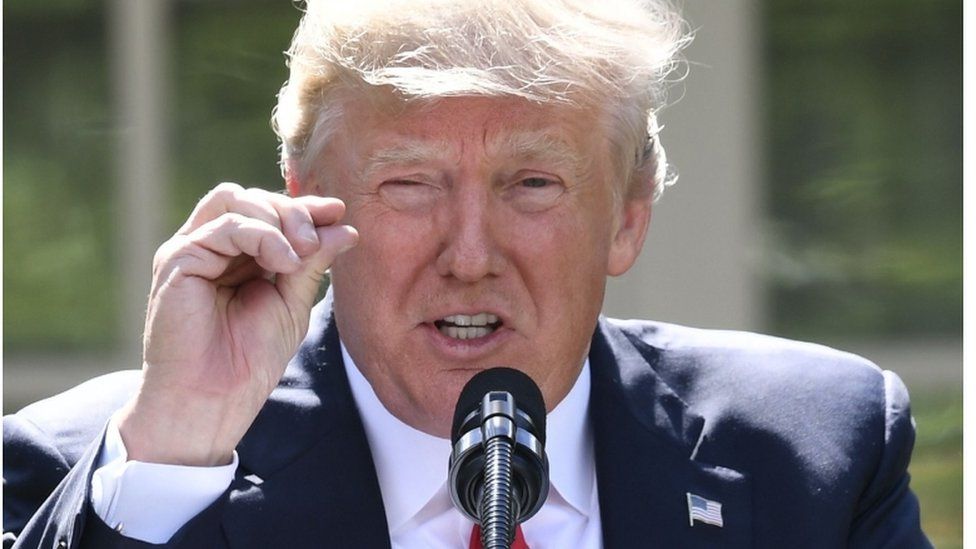Paris climate pullout: The worst is yet to come
- Published

President Trump's announcement a year ago that he was withdrawing the US from the Paris climate agreement may have been the best and worst thing that could have happened to the deal, at the same time.
"The most important piece of good news, and it wasn't a foregone conclusion, is that other countries have stayed in and doubled down on their general determination not to walk away, not to let the US 'cancel' the agreement," said former US climate envoy Todd Stern, speaking at a meeting organised by the World Resources Institute in Washington this week.
Indeed, in the wake of the President's much debated decision to pull out, the agreement gained rather than lost supporters with Syria and Nicaragua signing on to the deal, leaving the US as the world's solitary wallflower on climate change.
This galvanising effect of the President's dismissal of the pact can be seen clearly inside and outside the US.
The America's Pledge movement, led by California governor Jerry Brown and former New York mayor Michael Bloomberg, has pushed cities, states, businesses and universities to commit to reduce their emissions.
They point out that in 2017 non-federal climate action and sustained investment in clean energy meant that US emissions of CO2 fell to their lowest level in 25 years.
In the year since the President spoke, the US has added 9 gigawatts of renewable electricity capacity - enough to power more than 2 million homes. More coal power was "retired" in the first month of 2018 than in the two years between 2009 and 2011.
This is not just the actions of a handful of people - US states representing 35% of the population are expected to put a price on carbon dioxide emissions by the end of this year.
"If developments on renewables continue as positively as in the past, and new commitments by US states, cities and businesses are implemented, the US could still meet its Paris commitment," said Prof Niklas Höhne, from the NewClimate Institute.
Outside the US, the impact of the President's intentions on Paris has also forged a strong, positive response.
The UK and Canada launched a global alliance of 20 countries committed to phasing out coal for the production of energy.
The UK, Ireland, Norway, Germany, India and China and a host of other nations have also committed to phasing out petrol and diesel cars at various dates between 2024 and 2040.
Many countries have also decided that by 2050, they will be carbon neutral.
"Trump can announce what he will, but the reality on the ground, in the US and around the world, is that efforts to tackle climate change continue regardless and unabated," said Paula Caballero from WRI.
But these positive signals are not the full story. There is significant anxiety in the UN climate process that produced the Paris deal, that the US pullout is having a corrosive effect on efforts to move forward.
"In the absence of the US you have the phenomenon of a fair number of countries trying to pull back a little from some of the things that were agreed to in Paris," Todd Stern said.
Many countries had "extended themselves" beyond the point of comfort, knowing that Paris was a "big moment", and that the "US was walking arm-in-arm with China," he said.
In recent months, China appears to have decided that it is unhappy with one of the key elements of the Paris agreement, the provision that all countries, rich or poor, must undertake actions to cut emissions. They want to go back to a more divided approach, where the rich countries are the only ones compelled to take on carbon reductions.
With the US team essentially sidelined in the UN negotiations process and with Brexit pushing the UK away from the rest of Europe, there is a feeling that China is taking advantage of these events to push ahead with a backwards-looking agenda, more in tune with the political mood in the country. Just this week an analysis from Greenpeace suggested that emissions from China were rising at their fastest pace in seven years.
"If we don't organise the diplomacy in a way that there is somehow European countries (together) in geographic terms towards China, we are losing totally the game," said Laurence Tubiana, the former French diplomat who played a key role in the Paris negotiations.
"And the US isn't playing a very helpful game in shaping the international system."
One key but quiet aspect of the Trump withdrawal that is raising more and more concern is the question of finance. Around $10bn is due to be paid in to the Green Climate Fund by the end of this year, with the US having already contributed $1bn under President Obama.
As part of the US withdrawal, President Trump has immediately stopped the payment of the extra $2bn that had been promised.
Poorer countries especially are fuming about this imminent shortfall, and are also hugely irritated by what they see as some smugness among the better-off nations, whom they feel aren't going far enough or fast enough to cut carbon.
While the US move has on balance seen more positives than negatives in the first 12 months since the announcement, the waters ahead are distinctly choppy. The ripples from Trump's withdrawal are only starting to be felt. The worst is still ahead.